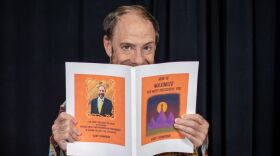-
In collaboration with the National New Play Network’s Rolling World Premiere program, Florida Repertory Theatre is mounting a production of playwright Brent Askari’s new comedy “ADVICE.” We’ll learn more about the play and the NNPN’s efforts to showcase contemporary playwrights and new plays in a conversation with Askari, the director of the Florida Rep’s production Brendon Fox, and NNPN Executive Director Nan Barnett.
-
A recent op-ed in the Wall Street Journal opens with the story of a man who believed his 83-year-old mother was plotting to assassinate him. His conversational partner and sounding board — in that case ChatGPT — told him he wasn’t crazy and his instincts were sharp, and that vigilance was fully justified. Not long after the man killed his mother before taking his own life. This is an example of what’s been dubbed ‘AI Psychosis’ — that’s when people are if not encouraged to cause harm to themselves or others, at least are not discouraged to do so by chatbots like ChatGPT or Gemini, or others. We talk with its author, who is co-founder of a nonprofit that's creating tools and demos to help people understand AI systems on a visceral level.
-
In the late 1990s an ethnobotanist named Dr. Paul Cox spent time in two villages on the Pacific island of Guam where a huge percentage of residents were dying of a neurodegenerative disorder that’s similar to Alzheimer’s Disease or ALS. He found links between the villagers’ diet, which included large fruit bats called flying foxes, and cyanobacteria toxins that were accumulating in the seeds of cycad trees, which the foxes would eat. This led to villagers having huge amounts of the toxins in their bodies. He joins us to talk about the work he did on Guam, and where the research is at today.
-
The name Ed Carlson is synonymous with the Audubon Corkscrew Swamp Sanctuary and he could rightfully be described as a legendary figure in the Southwest Florida environmental community. He passed away on Dec. 9 at the age of 75. Carlson’s stewardship of the sanctuary began when he stumbled into an internship right as he was graduating from high school in Miami in the late 1960s. He studied zoology and ornithology in college at University of South Florida with an eye on working with the land and water and wildlife. When Audubon received a grant to study wetlands from the National Science Foundation - right as he graduated from USF - it led him back to the sanctuary and he never left. We remember him through a conversation recorded in 2019.
-
The Foulds Theatre Gallery at the Alliance for the Arts in Fort Myers is showcasing an exhibition of works by Southwest Florida-based artist and painting instructor Terry Lynn Spry. We talk with the artist about works in the exhibition, her creative process, and approach to arts education.
-
William Golding’s novel Lord of the Flies recently marked its 70th birthday. To help celebrate, Dutch artist Aimee de Jongh created a gorgeous graphic novel adaptation of it.
-
WGCU’s Documentary unit produced a film earlier this year called Rising: Surviving the Surge. It’s a gripping exploration of Hurricane Ian’s impact and what followed as survivors worked to rise from the wreckage. It includes dramatic storm footage, powerful stories of resilience, and insights from scientists, first responders, and community leaders. On Nov. 13 we screened the film at Florida Gulf Coast University’s Water School and brought together a panel of experts from the university who had different areas of expertise to get their take on the film and have a conversation about what Ian showed us, and whether we could learn any lessons and even put them into action going forward to make Southwest Florida more resilient in the face of major hurricanes.
-
The Audubon Society’s Christmas Bird Count began on Christmas Day in the year 1900. During the annual count, birdwatchers walk around designated circular areas and count the type, and number of birds they see and hear over the course of the day. The information they collect is used to track bird populations in North and South America, and how they have changed over time. The Corkscrew Swamp Sanctuary’s Christmas Bird Count covers the sanctuary and its surroundings. This year it’s happening this coming Saturday, Dec. 20 and we talk with the Sanctuary's director to learn more.
-
In collaboration with the National New Play Network’s Rolling World Premiere program, Florida Repertory Theatre is mounting a production of playwright Brent Askari’s new comedy “ADVICE.” We’ll learn more about the play and the NNPN’s efforts to showcase contemporary playwrights and new plays in a conversation with Askari, the director of the Florida Rep’s production Brendon Fox, and NNPN Executive Director Nan Barnett.
-
We talk with a psychologist as well as a Bonita Springs student about how adolescents with diverse learning styles can thrive.
Play Live Radio
Next Up:
0:00
0:00
Available On Air Stations










